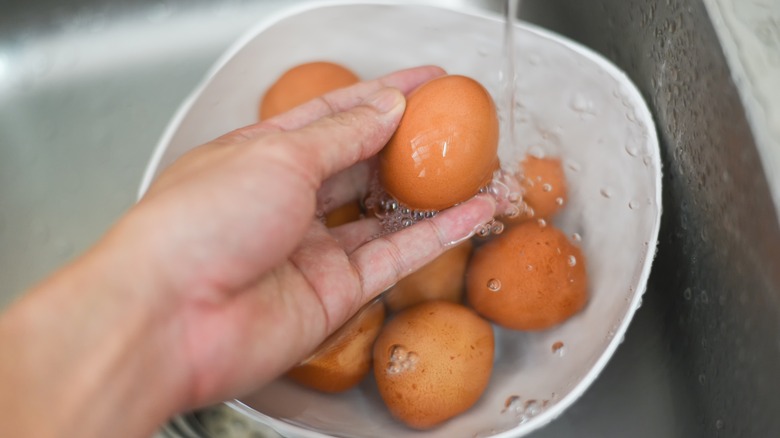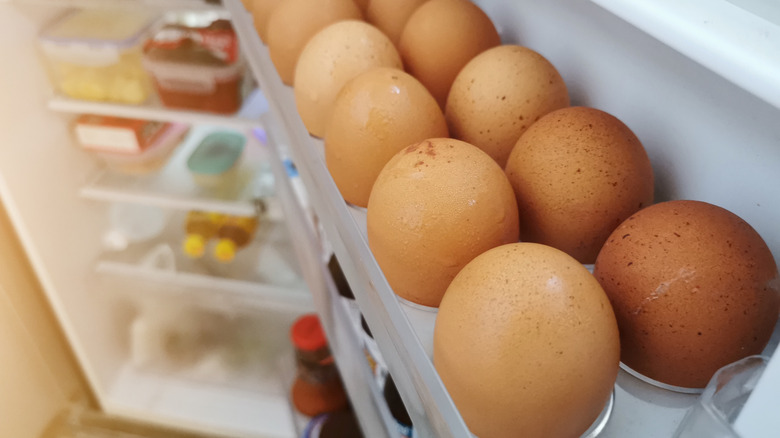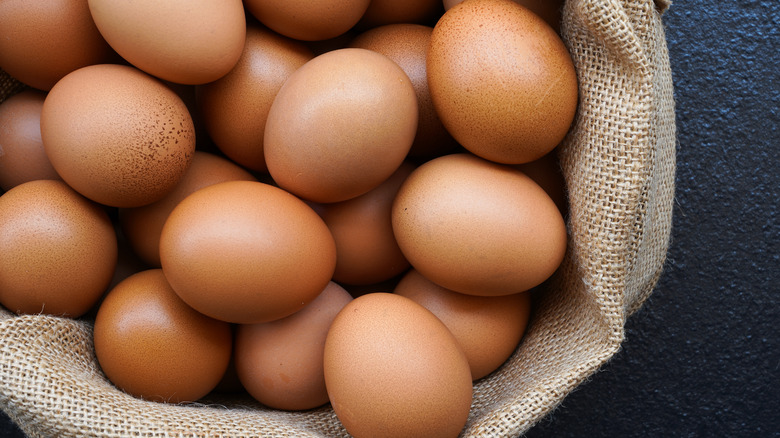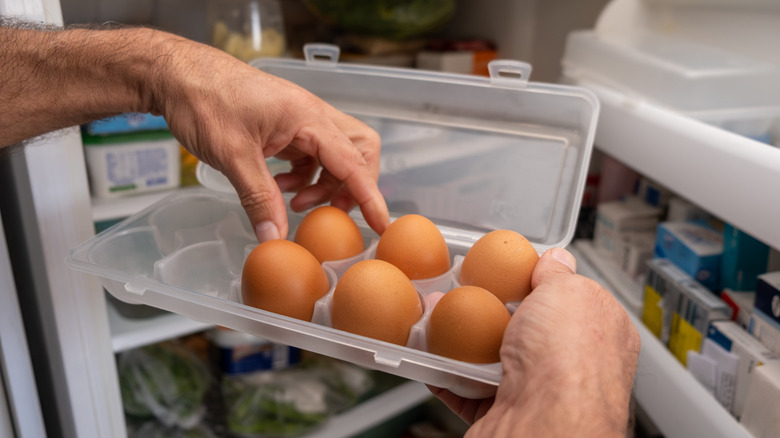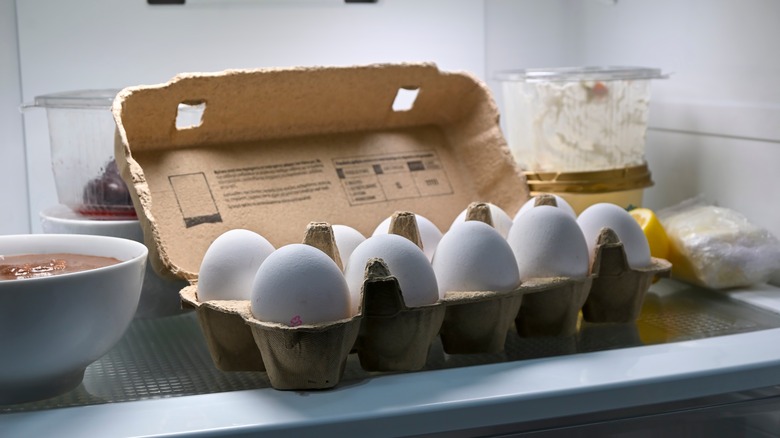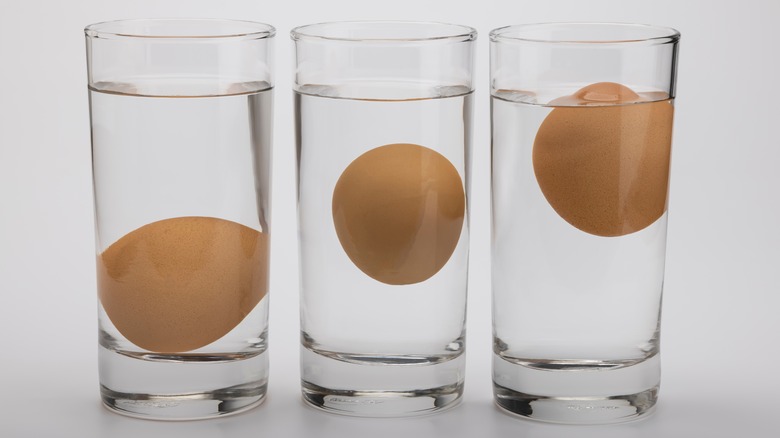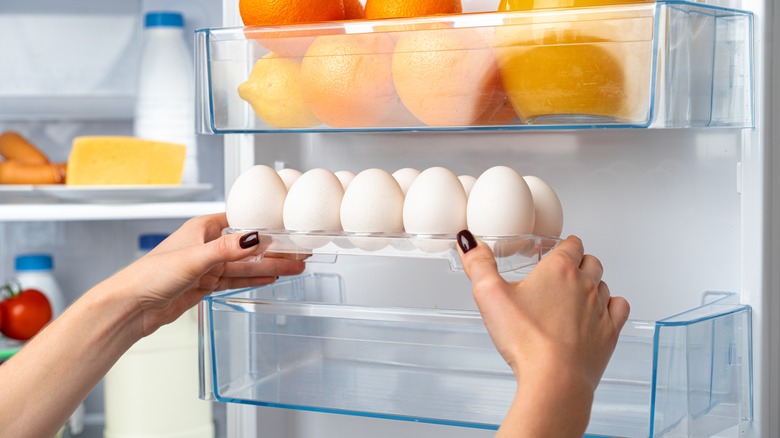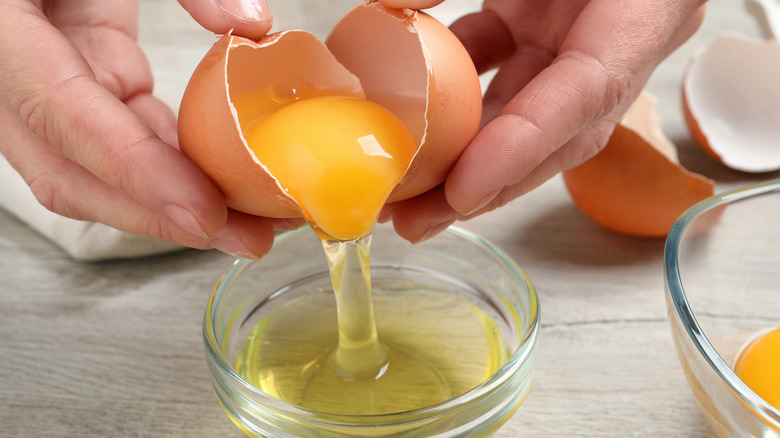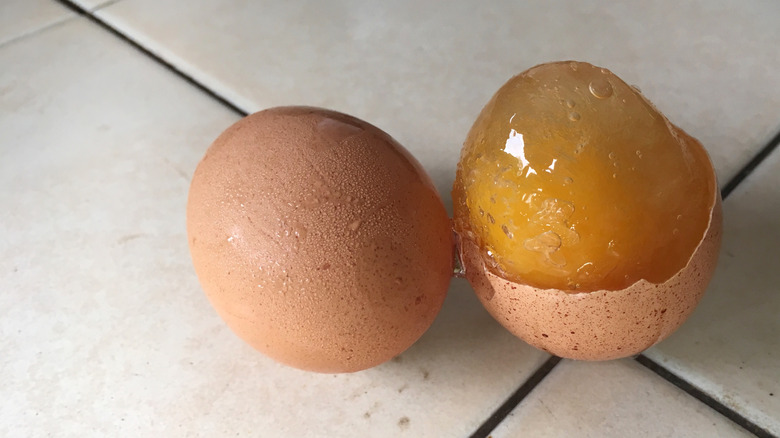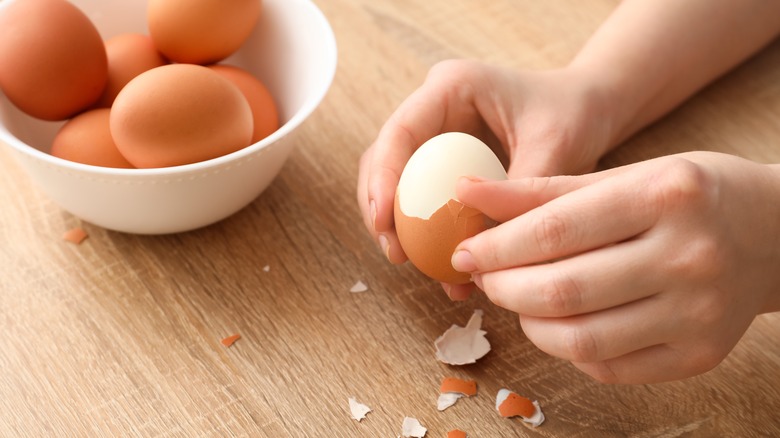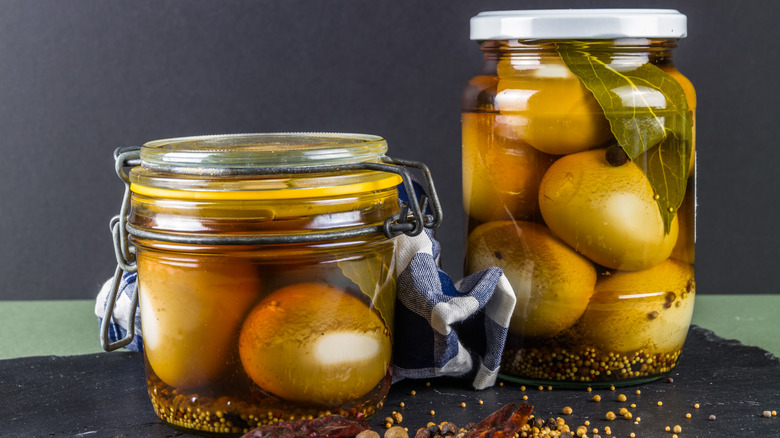13 Of The Biggest Mistakes You Might Be Making When Storing Eggs
Pretty much everyone has bought a carton of eggs at some point in their lives. In 2022 alone, 9.1 billion dozens of eggs were produced in the United States (per Statista). The ingredient is fundamental to hundreds of recipes, as well as a key food item on its own, and forms an integral part of breakfast, lunch, and dinner recipes.
Yet eggs can be uniquely difficult to store. Not only are they fragile, and liable to shatter if knocked or dropped, but they're also one of the main sources of Salmonella food poisoning out there. Salmonella can be carried on the shells of eggs, and work its way into the pores of the shells and the egg's yolk, according to the Government of South Australia. This makes the correct handling of them incredibly important.
To add to this, it can be especially difficult to assess the freshness of eggs, given that they're enclosed in a shell until they're ready to use — and storing them incorrectly can contribute to them going bad quicker than you might think. Luckily, a lot of these risks can be reduced by avoiding some of the main storage mistakes with your eggs.
1. Washing your eggs before storing them
Washing many types of produce is a key step in ensuring their safety, and it's particularly important with fresh items like fruits and vegetables. But if you've ever been told that you should wash eggs, you've been misled. Egg shells have approximately 7,000 pores in them, which allow gas to enter and escape the egg. But these pores can also allow moisture through them, including any water that you're washing the eggs with. As such, washing eggs can cause the wash water to seep into the interior of the egg, which may increase its chances of becoming contaminated, according to the U.S. Department of Agriculture.
Additionally, there's no need to wash eggs in the first place if you're buying them from a regular supermarket. These eggs, which are graded by the USDA, are already washed and sanitized by the time they reach the store, and are produced using pretty tight regulatory guidelines to ensure that they remain as safe as possible. This washing process strips away part of the egg's cuticle, an outer layer on the shell that prevents bacteria from entering it. As such, when you give it another wash, you're operating on a surface that may already be compromised.
2. Keeping eggs in your refrigerator door
If, like many, you keep your eggs in your refrigerator door, it's time to switch things up. A lot of refrigerators come with a built-in compartment in their doors which is specifically designed for storing eggs — but this doesn't do the safety of your product any favors. Every time you open and close your refrigerator door, you let the cold air that keeps the food inside fresh out and usher in warm air that can raise its temperature. The food in your refrigerator door is on the front line and will get way warmer than the food tucked away at the back. When this happens repeatedly, your eggs may perish faster.
Instead, "Eggs should be kept within the main body of refrigerators, preferably towards the back in an uncrowded area," states Electronic Temperature Instruments Ltd's Managing Director Jason Webb, via ETI Temperature. If you want to keep them consistently cool, place them on the bottom shelf, as any heat in your fridge tends to rise to the top. You should also make sure that your fridge is set to a low enough temperature. Keeping it around 40-41 degrees Fahrenheit will keep any bacterial growth on the food in your refrigerator to a minimum.
3. Storing eggs in a warm place
Pick up any carton of eggs in your local store, and they'll likely have been sitting in a refrigerated section. Yet if you've ever been to a supermarket in Europe or Asia, you'll notice that the eggs are left out at room temperature. This can lead some folks to assume that the way that eggs are stored in the U.S. is needlessly fussy, and in fact, eggs are perfectly fine to be kept on your countertop — but it's a misconception that could lead to your eggs going off fast, according to Organic Valley.
Eggs need to be refrigerated in the U.S. because they've already undergone a cleaning process that other countries don't practice, which leads to the removal of the egg's cuticle. Unfortunately, this also makes them more susceptible to infection from bacteria. By keeping your eggs in the fridge, you limit the ability of bacteria to reproduce and thereby keep your eggs safe for consumption.
Once you get your eggs home, place them straight in the refrigerator. Make sure that they don't warm up too much on your way home from the store, to limit their potential to grow bacteria. If you can, pick them up near the end of your shopping trip, and place them in an insulated bag on the journey home.
4. Stashing your eggs next to strong-smelling food
We've all had the experience of opening our refrigerators and catching a whiff of some pretty pungent food that we haven't covered properly. Unfortunately, placing that food next to your eggs could ruin their quality. Eggs are highly porous, and these pores not only allow gas to leak out, but other things to leak in. These can include any scents that are rattling around your refrigerator, and this can make your eggs taste pretty strange.
The solution is to keep your eggs as far away from strong-smelling food as possible and to ensure that they're well-covered. Leaving them in the carton they come in can help with this – don't be tempted to remove them and place them in open storage. If you need to get rid of the carton (if one of your eggs has cracked and leaked on it, for example), decant your eggs into a sealed container. You should also ensure that all of the food in your fridge is securely covered. Not only does covering food properly stop it from stinking out of your fridge, but it also helps prevent bacterial growth and stops it from losing moisture.
5. Forgetting to refrigerate your eggs immediately
If you're just home from a long shopping trip, it can be tempting to sit down and relax before you tackle the job of putting everything away. But when it comes to eggs, you shouldn't wait. Eggs need to be placed in the refrigerator pretty much immediately when you get home, as once they start to warm up, they can become a hotbed for bacteria. Once the egg warms up to the point where bacteria can start to grow (which can be anywhere between 40-140 degrees Fahrenheit, according to Healthline), it begins to become unsafe to eat, as that bacteria can work its way into the interior of the egg and cause foodborne illness.
Any egg or egg-based product that's been left out of the refrigerator for more than two hours should be thrown out. Farm-fresh eggs are the exception to this rule. As these eggs still have their cuticle intact, which acts as a barrier for bacteria, they may be safe at room temperature for a few days. Additionally, you should try to avoid moving your eggs in and out of the refrigerator. When cool eggs are allowed to sit in a warmer climate, they develop condensation on their shell, which creates the ideal environment for bacteria to both grow and move through the pores in the shell.
6. Storing your fresh eggs for too long
As an animal product, eggs are pretty perishable, and one of the main mistakes people make is storing them for too long. This can be pretty easily done if you take your eggs out of their carton, which can often have the most visible information about their use-by date. The good news is that eggs can last a pretty long time when still in their shell, and will usually remain edible for three to five weeks after the date of purchase, provided that they're kept in the fridge. The bad news, however, is that once they have gone bad, it can be hard to tell.
If you've taken your eggs out of their container and you're worried that they've been stored for too long, there are a few ways to check if they're still fresh. The easiest way is to put the egg in a bowl or glass of cold water. If it floats to the surface, it's inedible and has developed excess air inside the shell. If it sinks, though, it's still okay to eat, per Australian Eggs. You can also give your eggs a sniff: Gone-bad eggs will emit an overly eggy smell from the shell. Once eggs are cracked, it's generally more obvious if they've gone bad, as they'll usually have a runnier white, a dull-looking yolk, and an unpleasant scent.
7. Placing your eggs in another container
Unless your egg carton has been damaged to the point where it can't hold your eggs properly, you should always keep them in their original packaging. Egg cartons aren't just intended to keep the fragile product inside safe and secure. They also act as a barrier between the eggs and the cold circulating air in the refrigerator. That barrier prevents your eggs from absorbing any unwanted odors.
The egg carton that the eggs are transported in also contains vital information about their use-by date, which can help you keep on top of their freshness. They also may have information about the origins of the egg and any dietary information you might need. As well as this, egg boxes are specifically designed to provide the best protection for eggs and stop them from breaking or rubbing up against each other, and are usually made with materials that absorb knocks slightly more readily. By placing your eggs in a plastic container, you increase the likelihood that they'll clatter into each other and shatter.
8. Storing them point-side up
Eggs are typically sold with their pointed side up, which allows them to travel more securely and not rattle around too much in their boxes. But when you get them home, you should always flip them over. Eggs contain a small pocket of air at their rounder end, which sits between two membrane layers. This air pocket is largely why eggs are easier to peel from the bottom end, as your fingers can get under the shell more readily.
However, over time, this air pocket gets bigger, as gas and water vapor seeps out of the egg. This can lead to the pocket popping or tearing, which causes the egg to spoil, as any bacteria that's contained in the air pocket can seep into the egg itself. Turning it over so that its pointed side is facing down helps to prevent this from happening, according to Fresh Eggs Daily. As well as this, it also keeps the yolk centered in the middle of the egg, which not only protects the product but makes it way more uniform and aesthetically pleasing when cooked.
9. Keeping your new eggs in old cartons
Keeping an old egg carton around can seem like a smart thing to do. If you're buying eggs from a source that supplies them loosely, or contained in a carton that feels insecure, resorting to that trusty carton may feel like a great way to keep them safe. But reusing any leftover egg boxes should be avoided. These cartons are usually designed to be one-use products, usually made from cardboard or plastic, for the very reason that they contain products that can be easily contaminated. If you start swapping out old eggs for new ones, you increase the chances of cross-contamination occurring, according to the USDA.
As well as avoiding reusing cartons, it's useful to take additional food safety precautions when handling eggs to prevent cross-contamination. Make sure you're only handling eggs with clean hands washed in warm, soapy water, and wash your hands after touching them, too. Try to avoid placing your eggs on cutting boards or plates that might then be used to prepare other fresh food items like meat or poultry, and ensure you sanitize all kitchen areas and utensils that you've touched fully after handling eggs.
10. Forgetting to store your leftover egg yolks properly
Many recipes require the separation of egg whites from their yolks, and it's often the case that you're left with several yolks that you don't know what to do with. But rather than throw them out, keep them on hand to make your scrambled eggs or sauces extra creamy. To do this, though, you'll need to ensure that you're storing them properly. Egg yolks are prone to drying out once they've been separated from the whites, so cover them in a small amount of cold water and pop them in a sealed container in your refrigerator. Sealing them will stop the yolks from drying out further in the chilly air in your ffridge, and will keep them fresh.
Leftover raw egg whites should also be stored in an airtight container, but there's no need to add any additional water as their moisture content is already quite high. It's worth remembering that both egg yolks and egg whites will only last a few days in the fridge, and should be consumed within two to four days. Any longer than that, and you risk them going bad and becoming dangerous to consume, according to Get Cracking.
11. Freezing eggs in their shell
Both raw and cooked eggs can be frozen, but only once they've been prepared properly. And crucially, they should never be placed in the freezer when still in their shell. If you try and freeze a raw egg that's still in its shell, the liquified inside will expand as it gets colder. This will cause the eggshell to explode, leading to a hugely messy clean-up operation and unusable eggs. Freezing cooked hard-boiled eggs in their shell, meanwhile, won't cause them to explode but it will degrade the quality of the egg itself, causing the egg whites to become overly rubbery.
Instead, you should always prepare your eggs properly for freezing. Raw eggs must be cracked and decanted into a freezer-safe container, with enough space in it to account for their expansion in the freezer. You should either separate the egg whites and yolks and freeze them separately, or beat them together. Freezing egg yolks separately requires a bit of extra preparation by adding salt or sugar so they don't turn jelly-like. Cooked eggs are best frozen when they're prepared after being beaten together, with frittatas, scrambled eggs, and omelets all freezable. Just make sure you're writing the date that you froze them on the container you're using so that you're not keeping them in your freezer for too long.
12. Storing hard-boiled eggs for too long
Preparing hard-boiled eggs in advance is a great way to get ahead on your meals. But once eggs are cooked, they become way more perishable. Although fresh eggs can last in your fridge for three to five weeks, hard-boiled eggs will only stay fresh for up to seven days before it starts to go bad. For best results, you should keep them in their shells until they're ready to eat, as this will help them to retain moisture. If you do need to peel them, though, make sure you cover them with water or some damp paper towel.
Other types of cooked eggs may have a shorter lifespan in your refrigerator. Scrambled eggs and quiches, for example, will only last for three to four days before you need to throw them out. Soft-boiled eggs remain fresh for an even shorter period, and will generally only be edible for two days after being cooked. You'll generally be able to assess whether your eggs are still good to eat by smelling them and assessing their texture. If they've started to smell unpleasant, or they develop a slimy surface, they should be disposed of immediately.
13. Assuming that pickled eggs can be stored forever
Pickling is one of the oldest methods of preservation, and as well as pickled vegetables, fish, and meat, pickled eggs can be widely found around the world. But while pickling can extend the life of your eggs, it won't keep them fresh forever. Pickled eggs should be eaten within three to four months before being thrown out. Although pickling food in vinegar prevents the microorganisms that would usually degrade it and cause it to go bad from operating effectively, after a certain amount of time, your pickled eggs will likely disintegrate and lose both their fresh flavor and texture.
If you open your jar of pickled eggs and notice a particularly funky or nasty smell, they should always be disposed of immediately. Make sure you aren't consuming the eggs past the use-by date printed on the jar, and keep them in the refrigerator at all times. As well as this, while you can make pickled eggs at home, it's usually far safer to buy them from the store. In one case, homemade pickled eggs were linked to botulism, a highly dangerous form of bacterial food poisoning that can lead to paralysis (per the World Health Organization).

